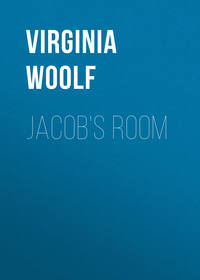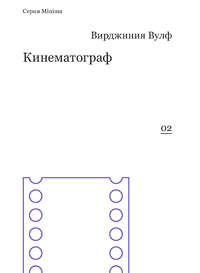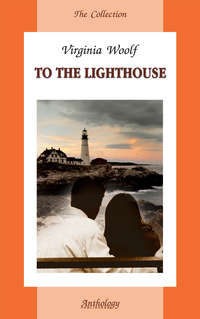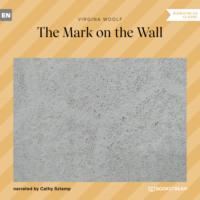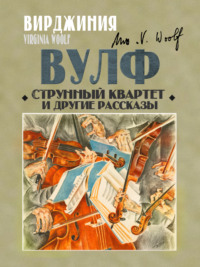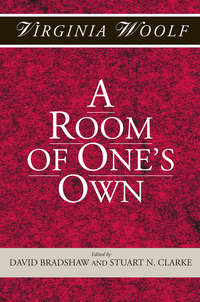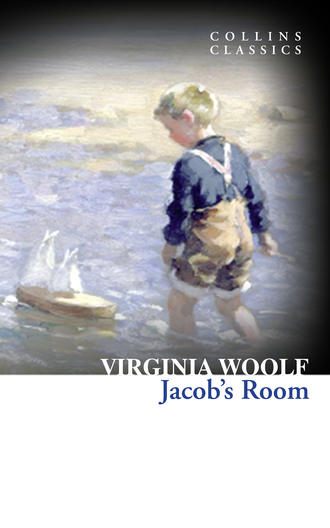
Полная версия
Jacob’s Room
Jacob’s room had a round table and two low chairs. There were yellow flags in a jar on the mantelpiece; a photograph of his mother; cards from societies with little raised crescents, coats of arms, and initials; notes and pipes; on the table lay paper ruled with a red margin—an essay, no doubt—“Does History consist of the Biographies of Great Men?” There were books enough; very few French books; but then anyone who’s worth anything reads just what he likes, as the mood takes him, with extravagant enthusiasm. Lives of the Duke of Wellington, for example; Spinoza; the works of Dickens; the Faery Queen; a Greek dictionary with the petals of poppies pressed to silk between the pages; all the Elizabethans. His slippers were incredibly shabby, like boats burnt to the water’s rim. Then there were photographs from the Greeks, and a mezzotint from Sir Joshua—all very English. The works of Jane Austen, too, in deference, perhaps, to someone else’s standard. Carlyle was a prize. There were books upon the Italian painters of the Renaissance, a Manual of the Diseases of the Horse, and all the usual text-books. Listless is the air in an empty room, just swelling the curtain; the flowers in the jar shift. One fibre in the wicker arm-chair creaks, though no one sits there.
Coming down the steps a little sideways [Jacob sat on the window-seat talking to Durrant; he smoked, and Durrant looked at the map], the old man, with his hands locked behind him, his gown floating black, lurched, unsteadily, near the wall; then, upstairs he went into his room. Then another, who raised his hand and praised the columns, the gate, the sky; another, tripping and smug. Each went up a staircase; three lights were lit in the dark windows.
If any light burns above Cambridge, it must be from three such rooms; Greek burns here; science there; philosophy on the ground floor. Poor old Huxtable can’t walk straight;—Sopwith, too, has praised the sky any night these twenty years; and Cowan still chuckles at the same stories. It is not simple, or pure, or wholly splendid, the lamp of learning, since if you see them there under its light (whether Rossetti’s on the wall, or Van Gogh reproduced, whether there are lilacs in the bowl or rusty pipes), how priestly they look! How like a suburb where you go to see a view and eat a special cake! “We are the sole purveyors of this cake.” Back you go to London; for the treat is over.
Old Professor Huxtable, performing with the method of a clock his change of dress, let himself down into his chair; filled his pipe; chose his paper; crossed his feet; and extracted his glasses. The whole flesh of his face then fell into folds as if props were removed. Yet strip a whole seat of an underground railway carriage of its heads and old Huxtable’s head will hold them all. Now, as his eye goes down the print, what a procession tramps through the corridors of his brain, orderly, quick-stepping, and reinforced, as the march goes on, by fresh runnels, till the whole hall, dome, whatever one calls it, is populous with ideas. Such a muster takes place in no other brain. Yet sometimes there he’ll sit for hours together, gripping the arm of the chair, like a man holding fast because stranded, and then, just because his corn twinges, or it may be the gout, what execrations, and, dear me, to hear him talk of money, taking out his leather purse and grudging even the smallest silver coin, secretive and suspicious as an old peasant woman with all her lies. Strange paralysis and constriction—marvellous illumination. Serene over it all rides the great full brow, and sometimes asleep or in the quiet spaces of the night you might fancy that on a pillow of stone he lay triumphant.
Sopwith, meanwhile, advancing with a curious trip from the fire-place, cut the chocolate cake into segments. Until midnight or later there would be undergraduates in his room, sometimes as many as twelve, sometimes three or four; but nobody got up when they went or when they came; Sopwith went on talking. Talking, talking, talking—as if everything could be talked—the soul itself slipped through the lips in thin silver disks which dissolve in young men’s minds like silver, like moonlight. Oh, far away they’d remember it, and deep in dulness gaze back on it, and come to refresh themselves again.
“Well, I never. That’s old Chucky. My dear boy, how’s the world treating you?” And in came poor little Chucky, the unsuccessful provincial, Stenhouse his real name, but of course Sopwith brought back by using the other everything, everything, “all I could never be”—yes, though next day, buying his newspaper and catching the early train, it all seemed to him childish, absurd; the chocolate cake, the young men; Sopwith summing things up; no, not all; he would send his son there. He would save every penny to send his son there.
Sopwith went on talking; twining stiff fibres of awkward speech—things young men blurted out—plaiting them round his own smooth garland, making the bright side show, the vivid greens, the sharp thorns, manliness. He loved it. Indeed to Sopwith a man could say anything, until perhaps he’d grown old, or gone under, gone deep, when the silver disks would tinkle hollow, and the inscription read a little too simple, and the old stamp look too pure, and the impress always the same—a Greek boy’s head. But he would respect still. A woman, divining the priest, would, involuntarily, despise.
Cowan, Erasmus Cowan, sipped his port alone, or with one rosy little man, whose memory held precisely the same span of time; sipped his port, and told his stories, and without book before him intoned Latin, Virgil and Catullus, as if language were wine upon his lips. Only—sometimes it will come over one—what if the poet strode in? “THIS my image?” he might ask, pointing to the chubby man, whose brain is, after all, Virgil’s representative among us, though the body gluttonize, and as for arms, bees, or even the plough, Cowan takes his trips abroad with a French novel in his pocket, a rug about his knees, and is thankful to be home again in his place, in his line, holding up in his snug little mirror the image of Virgil, all rayed round with good stories of the dons of Trinity and red beams of port. But language is wine upon his lips. Nowhere else would Virgil hear the like. And though, as she goes sauntering along the Backs, old Miss Umphelby sings him melodiously enough, accurately too, she is always brought up by this question as she reaches Clare Bridge: “But if I met him, what should I wear?”—and then, taking her way up the avenue towards Newnham, she lets her fancy play upon other details of men’s meeting with women which have never got into print. Her lectures, therefore, are not half so well attended as those of Cowan, and the thing she might have said in elucidation of the text for ever left out. In short, face a teacher with the image of the taught and the mirror breaks. But Cowan sipped his port, his exaltation over, no longer the representative of Virgil. No, the builder, assessor, surveyor, rather; ruling lines between names, hanging lists above doors. Such is the fabric through which the light must shine, if shine it can—the light of all these languages, Chinese and Russian, Persian and Arabic, of symbols and figures, of history, of things that are known and things that are about to be known. So that if at night, far out at sea over the tumbling waves, one saw a haze on the waters, a city illuminated, a whiteness even in the sky, such as that now over the Hall of Trinity where they’re still dining, or washing up plates, that would be the light burning there—the light of Cambridge.
“Let’s go round to Simeon’s room,” said Jacob, and they rolled up the map, having got the whole thing settled.
All the lights were coming out round the court, and falling on the cobbles, picking out dark patches of grass and single daisies. The young men were now back in their rooms. Heaven knows what they were doing. What was it that could DROP like that? And leaning down over a foaming window-box, one stopped another hurrying past, and upstairs they went and down they went, until a sort of fulness settled on the court, the hive full of bees, the bees home thick with gold, drowsy, humming, suddenly vocal; the Moonlight Sonata answered by a waltz.
The Moonlight Sonata tinkled away; the waltz crashed. Although young men still went in and out, they walked as if keeping engagements. Now and then there was a thud, as if some heavy piece of furniture had fallen, unexpectedly, of its own accord, not in the general stir of life after dinner. One supposed that young men raised their eyes from their books as the furniture fell. Were they reading? Certainly there was a sense of concentration in the air. Behind the grey walls sat so many young men, some undoubtedly reading, magazines, shilling shockers, no doubt; legs, perhaps, over the arms of chairs; smoking; sprawling over tables, and writing while their heads went round in a circle as the pen moved—simple young men, these, who would—but there is no need to think of them grown old; others eating sweets; here they boxed; and, well, Mr. Hawkins must have been mad suddenly to throw up his window and bawl: “Jo—seph! Jo—seph!” and then he ran as hard as ever he could across the court, while an elderly man, in a green apron, carrying an immense pile of tin covers, hesitated, balanced, and then went on. But this was a diversion. There were young men who read, lying in shallow arm-chairs, holding their books as if they had hold in their hands of something that would see them through; they being all in a torment, coming from midland towns, clergymen’s sons. Others read Keats. And those long histories in many volumes—surely someone was now beginning at the beginning in order to understand the Holy Roman Empire, as one must. That was part of the concentration, though it would be dangerous on a hot spring night—dangerous, perhaps, to concentrate too much upon single books, actual chapters, when at any moment the door opened and Jacob appeared; or Richard Bonamy, reading Keats no longer, began making long pink spills from an old newspaper, bending forward, and looking eager and contented no more, but almost fierce. Why? Only perhaps that Keats died young—one wants to write poetry too and to love—oh, the brutes! It’s damnably difficult. But, after all, not so difficult if on the next staircase, in the large room, there are two, three, five young men all convinced of this—of brutality, that is, and the clear division between right and wrong. There was a sofa, chairs, a square table, and the window being open, one could see how they sat—legs issuing here, one there crumpled in a corner of the sofa; and, presumably, for you could not see him, somebody stood by the fender, talking. Anyhow, Jacob, who sat astride a chair and ate dates from a long box, burst out laughing. The answer came from the sofa corner; for his pipe was held in the air, then replaced. Jacob wheeled round. He had something to say to THAT, though the sturdy red-haired boy at the table seemed to deny it, wagging his head slowly from side to side; and then, taking out his penknife, he dug the point of it again and again into a knot in the table, as if affirming that the voice from the fender spoke the truth—which Jacob could not deny. Possibly, when he had done arranging the date-stones, he might find something to say to it—indeed his lips opened—only then there broke out a roar of laughter.
The laughter died in the air. The sound of it could scarcely have reached anyone standing by the Chapel, which stretched along the opposite side of the court. The laughter died out, and only gestures of arms, movements of bodies, could be seen shaping something in the room. Was it an argument? A bet on the boat races? Was it nothing of the sort? What was shaped by the arms and bodies moving in the twilight room?
A step or two beyond the window there was nothing at all, except the enclosing buildings—chimneys upright, roofs horizontal; too much brick and building for a May night, perhaps. And then before one’s eyes would come the bare hills of Turkey—sharp lines, dry earth, coloured flowers, and colour on the shoulders of the women, standing naked-legged in the stream to beat linen on the stones. The stream made loops of water round their ankles. But none of that could show clearly through the swaddlings and blanketings of the Cambridge night. The stroke of the clock even was muffled; as if intoned by somebody reverent from a pulpit; as if generations of learned men heard the last hour go rolling through their ranks and issued it, already smooth and time-worn, with their blessing, for the use of the living.
Was it to receive this gift from the past that the young man came to the window and stood there, looking out across the court? It was Jacob. He stood smoking his pipe while the last stroke of the clock purred softly round him. Perhaps there had been an argument. He looked satisfied; indeed masterly; which expression changed slightly as he stood there, the sound of the clock conveying to him (it may be) a sense of old buildings and time; and himself the inheritor; and then to-morrow; and friends; at the thought of whom, in sheer confidence and pleasure, it seemed, he yawned and stretched himself.
Meanwhile behind him the shape they had made, whether by argument or not, the spiritual shape, hard yet ephemeral, as of glass compared with the dark stone of the Chapel, was dashed to splinters, young men rising from chairs and sofa corners, buzzing and barging about the room, one driving another against the bedroom door, which giving way, in they fell. Then Jacob was left there, in the shallow arm-chair, alone with Masham? Anderson? Simeon? Oh, it was Simeon. The others had all gone.
“… Julian the Apostate. …” Which of them said that and the other words murmured round it? But about midnight there sometimes rises, like a veiled figure suddenly woken, a heavy wind; and this now flapping through Trinity lifted unseen leaves and blurred everything. “Julian the Apostate”—and then the wind. Up go the elm branches, out blow the sails, the old schooners rear and plunge, the grey waves in the hot Indian Ocean tumble sultrily, and then all falls flat again.
So, if the veiled lady stepped through the Courts of Trinity, she now drowsed once more, all her draperies about her, her head against a pillar.
“Somehow it seems to matter.”
The low voice was Simeon’s.
The voice was even lower that answered him. The sharp tap of a pipe on the mantelpiece cancelled the words. And perhaps Jacob only said “hum,” or said nothing at all. True, the words were inaudible. It was the intimacy, a sort of spiritual suppleness, when mind prints upon mind indelibly.
“Well, you seem to have studied the subject,” said Jacob, rising and standing over Simeon’s chair. He balanced himself; he swayed a little. He appeared extraordinarily happy, as if his pleasure would brim and spill down the sides if Simeon spoke.
Simeon said nothing. Jacob remained standing. But intimacy—the room was full of it, still, deep, like a pool. Without need of movement or speech it rose softly and washed over everything, mollifying, kindling, and coating the mind with the lustre of pearl, so that if you talk of a light, of Cambridge burning, it’s not languages only. It’s Julian the Apostate.
But Jacob moved. He murmured good-night. He went out into the court. He buttoned his jacket across his chest. He went back to his rooms, and being the only man who walked at that moment back to his rooms, his footsteps rang out, his figure loomed large. Back from the Chapel, back from the Hall, back from the Library, came the sound of his footsteps, as if the old stone echoed with magisterial authority: “The young man—the young man—the young man-back to his rooms.”
CHAPTER 4
What’s the use of trying to read Shakespeare, especially in one of those little thin paper editions whose pages get ruffled, or stuck together with sea-water? Although the plays of Shakespeare had frequently been praised, even quoted, and placed higher than the Greek, never since they started had Jacob managed to read one through. Yet what an opportunity!
For the Scilly Isles had been sighted by Timmy Durrant lying like mountain-tops almost a-wash in precisely the right place. His calculations had worked perfectly, and really the sight of him sitting there, with his hand on the tiller, rosy gilled, with a sprout of beard, looking sternly at the stars, then at a compass, spelling out quite correctly his page of the eternal lesson-book, would have moved a woman. Jacob, of course, was not a woman. The sight of Timmy Durrant was no sight for him, nothing to set against the sky and worship; far from it. They had quarrelled. Why the right way to open a tin of beef, with Shakespeare on board, under conditions of such splendour, should have turned them to sulky schoolboys, none can tell. Tinned beef is cold eating, though; and salt water spoils biscuits; and the waves tumble and lollop much the same hour after hour—tumble and lollop all across the horizon. Now a spray of seaweed floats past-now a log of wood. Ships have been wrecked here. One or two go past, keeping their own side of the road. Timmy knew where they were bound, what their cargoes were, and, by looking through his glass, could tell the name of the line, and even guess what dividends it paid its shareholders. Yet that was no reason for Jacob to turn sulky.
The Scilly Isles had the look of mountain-tops almost a-wash. … Unfortunately, Jacob broke the pin of the Primus stove.
The Scilly Isles might well be obliterated by a roller sweeping straight across.
But one must give young men the credit of admitting that, though breakfast eaten under these circumstances is grim, it is sincere enough. No need to make conversation. They got out their pipes.
Timmy wrote up some scientific observations; and—what was the question that broke the silence—the exact time or the day of the month? anyhow, it was spoken without the least awkwardness; in the most matter-of-fact way in the world; and then Jacob began to unbutton his clothes and sat naked, save for his shirt, intending, apparently, to bathe.
The Scilly Isles were turning bluish; and suddenly blue, purple, and green flushed the sea; left it grey; struck a stripe which vanished; but when Jacob had got his shirt over his head the whole floor of the waves was blue and white, rippling and crisp, though now and again a broad purple mark appeared, like a bruise; or there floated an entire emerald tinged with yellow. He plunged. He gulped in water, spat it out, struck with his right arm, struck with his left, was towed by a rope, gasped, splashed, and was hauled on board.
The seat in the boat was positively hot, and the sun warmed his back as he sat naked with a towel in his hand, looking at the Scilly Isles which—confound it! the sail flapped. Shakespeare was knocked overboard. There you could see him floating merrily away, with all his pages ruffling innumerably; and then he went under.
Strangely enough, you could smell violets, or if violets were impossible in July, they must grow something very pungent on the mainland then. The mainland, not so very far off—you could see clefts in the cliffs, white cottages, smoke going up—wore an extraordinary look of calm, of sunny peace, as if wisdom and piety had descended upon the dwellers there. Now a cry sounded, as of a man calling pilchards in a main street. It wore an extraordinary look of piety and peace, as if old men smoked by the door, and girls stood, hands on hips, at the well, and horses stood; as if the end of the world had come, and cabbage fields and stone walls, and coast-guard stations, and, above all, the white sand bays with the waves breaking unseen by anyone, rose to heaven in a kind of ecstasy.
But imperceptibly the cottage smoke droops, has the look of a mourning emblem, a flag floating its caress over a grave. The gulls, making their broad flight and then riding at peace, seem to mark the grave.
No doubt if this were Italy, Greece, or even the shores of Spain, sadness would be routed by strangeness and excitement and the nudge of a classical education. But the Cornish hills have stark chimneys standing on them; and, somehow or other, loveliness is infernally sad. Yes, the chimneys and the coast-guard stations and the little bays with the waves breaking unseen by anyone make one remember the overpowering sorrow. And what can this sorrow be?
It is brewed by the earth itself. It comes from the houses on the coast. We start transparent, and then the cloud thickens. All history backs our pane of glass. To escape is vain.
But whether this is the right interpretation of Jacob’s gloom as he sat naked, in the sun, looking at the Land’s End, it is impossible to say; for he never spoke a word. Timmy sometimes wondered (only for a second) whether his people bothered him. … No matter. There are things that can’t be said. Let’s shake it off. Let’s dry ourselves, and take up the first thing that comes handy. … Timmy Durrant’s notebook of scientific observations.
“Now …” said Jacob.
It is a tremendous argument.
Some people can follow every step of the way, and even take a little one, six inches long, by themselves at the end; others remain observant of the external signs.
The eyes fix themselves upon the poker; the right hand takes the poker and lifts it; turns it slowly round, and then, very accurately, replaces it. The left hand, which lies on the knee, plays some stately but intermittent piece of march music. A deep breath is taken; but allowed to evaporate unused. The cat marches across the hearth-rug. No one observes her.
“That’s about as near as I can get to it,” Durrant wound up.
The next minute is quiet as the grave.
“It follows …” said Jacob.
Only half a sentence followed; but these half-sentences are like flags set on tops of buildings to the observer of external sights down below. What was the coast of Cornwall, with its violet scents, and mourning emblems, and tranquil piety, but a screen happening to hang straight behind as his mind marched up?
“It follows …” said Jacob.
“Yes,” said Timmy, after reflection. “That is so.”
Now Jacob began plunging about, half to stretch himself, half in a kind of jollity, no doubt, for the strangest sound issued from his lips as he furled the sail, rubbed the plates—gruff, tuneless—a sort of pasan, for having grasped the argument, for being master of the situation, sunburnt, unshaven, capable into the bargain of sailing round the world in a ten-ton yacht, which, very likely, he would do one of these days instead of settling down in a lawyer’s office, and wearing spats.
“Our friend Masham,” said Timmy Durrant, “would rather not be seen in our company as we are now.” His buttons had come off.
“D’you know Masham’s aunt?” said Jacob.
“Never knew he had one,” said Timmy.
“Masham has millions of aunts,” said Jacob.
“Masham is mentioned in Domesday Book,” said Timmy.
“So are his aunts,” said Jacob.
“His sister,” said Timmy, “is a very pretty girl.”
“That’s what’ll happen to you, Timmy,” said Jacob.
“It’ll happen to you first,” said Timmy.
“But this woman I was telling you about—Masham’s aunt—”
“Oh, do get on,” said Timmy, for Jacob was laughing so much that he could not speak.
“Masham’s aunt …”
Timmy laughed so much that he could not speak.
“Masham’s aunt …”
“What is there about Masham that makes one laugh?” said Timmy.
“Hang it all—a man who swallows his tie-pin,” said Jacob.
“Lord Chancellor before he’s fifty,” said Timmy.
“He’s a gentleman,” said Jacob.
“The Duke of Wellington was a gentleman,” said Timmy.
“Keats wasn’t.”
“Lord Salisbury was.”
“And what about God?” said Jacob.
The Scilly Isles now appeared as if directly pointed at by a golden finger issuing from a cloud; and everybody knows how portentous that sight is, and how these broad rays, whether they light upon the Scilly Isles or upon the tombs of crusaders in cathedrals, always shake the very foundations of scepticism and lead to jokes about God.
“Abide with me:
Fast falls the eventide;
The shadows deepen;
Lord, with me abide,”


